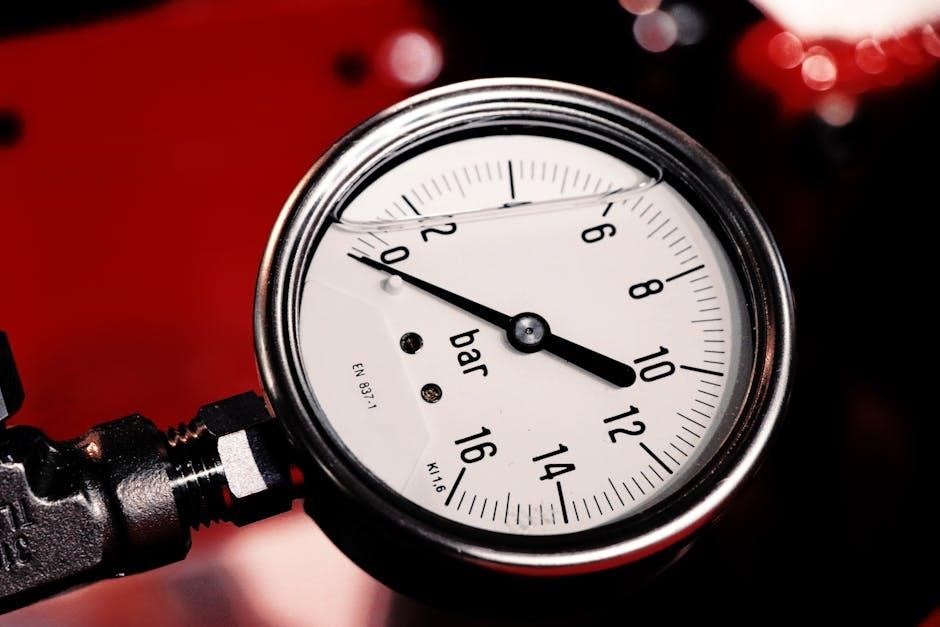The Rancho Los Amigos Scale is a cognitive recovery scale
Overview of the Scale
The Rancho Los Amigos Scale is a widely used assessment tool that evaluates the cognitive functioning of patients with traumatic brain injuries. The scale provides a comprehensive overview of a patient’s recovery progress‚ from the initial stages of coma to the final stages of community reintegration. The scale is divided into ten distinct levels‚ each describing a specific stage of cognitive recovery. The levels are designed to be sequential‚ with each level building on the previous one‚ allowing healthcare professionals to track a patient’s progress over time. The scale is commonly used in rehabilitation settings to guide treatment planning and to monitor patient outcomes. By providing a standardized framework for assessing cognitive functioning‚ the Rancho Los Amigos Scale enables healthcare professionals to communicate effectively and make informed decisions about patient care. The scale has been widely adopted in clinical practice and is considered a valuable tool in the assessment and management of traumatic brain injuries.

History of the Rancho Los Amigos Scale
The scale was developed in California by a renowned brain injury rehabilitation hospital team slowly.
Development of the Scale
The development of the Rancho Los Amigos Scale was a gradual process that involved the collaboration of a team of experts in the field of brain injury rehabilitation. The scale was designed to provide a comprehensive framework for evaluating the cognitive and functional abilities of patients with traumatic brain injuries. The team of developers drew on their extensive experience in working with brain-injured patients to create a scale that would be both practical and effective in assessing the levels of cognitive recovery. The scale was refined and revised over time to ensure that it was accurate and reliable in its assessment of patient outcomes. The development of the scale was influenced by the need for a standardized tool that could be used to evaluate the progress of patients with brain injuries and to guide rehabilitation efforts. The resulting scale has been widely adopted and is now used in many rehabilitation settings around the world.

Levels of the Rancho Los Amigos Scale
The scale has ten levels of cognitive recovery and functioning abilities
Level I — No Response
The first level of the Rancho Los Amigos Scale is characterized by a lack of response to external stimuli‚ indicating a severe impairment of cognitive function.
Patients at this level do not exhibit any voluntary movements or reactions to their environment‚ and their neurological responses are limited to primitive reflexes.
This level is often associated with a coma or vegetative state‚ and patients may require extensive medical support to maintain their basic physiological functions.
The diagnosis and assessment of patients at this level require careful observation and monitoring by medical professionals to identify any potential changes in their condition.
According to the scale‚ patients at Level I are not able to follow commands or respond to verbal cues‚ and their cognitive abilities are severely impaired.
The Rancho Los Amigos Scale provides a framework for evaluating and tracking the progress of patients with severe brain injuries‚ and Level I represents the most severe level of impairment.
Medical professionals use this scale to develop individualized treatment plans and to monitor the patient’s progress over time.
The scale has been widely adopted in clinical settings and is considered a valuable tool for assessing and managing patients with traumatic brain injuries.
Level II ― Generalized Response
At Level II of the Rancho Los Amigos Scale‚ patients begin to exhibit generalized responses to external stimuli‚ indicating a slight improvement in their cognitive function.
These responses are often non-specific and may not be directly related to the stimulus‚ but they demonstrate a growing awareness of the environment.
Patients at this level may display reflexive movements or reactions‚ such as turning their head towards a sound or withdrawing from a painful stimulus.
While their responses are still limited and lack specificity‚ they represent a significant step forward in the recovery process.
The scale notes that patients at Level II are not yet able to follow commands or engage in purposeful behaviors‚ but their generalized responses suggest a potential for further improvement.
Medical professionals carefully monitor patients at this level‚ looking for signs of progress and adjusting their treatment plans accordingly.
The Rancho Los Amigos Scale provides a nuanced framework for evaluating patients with brain injuries‚ and Level II represents a critical milestone in the recovery process.
By tracking patient progress through this scale‚ healthcare providers can develop targeted interventions to support continued improvement.

Application of the Rancho Los Amigos Scale
The scale is used in brain injury rehabilitation to track patient progress and guide treatment plans effectively always.
Use in Brain Injury Rehabilitation
The Rancho Los Amigos Scale is widely used in brain injury rehabilitation settings to assess and track the progress of patients with traumatic brain injuries.
The scale provides a framework for clinicians to evaluate the cognitive and functional abilities of patients and develop individualized treatment plans.
The use of the scale in brain injury rehabilitation has been shown to be effective in improving patient outcomes and facilitating communication among healthcare providers.
The scale is also used to monitor patient progress over time and make adjustments to treatment plans as needed.
Overall‚ the Rancho Los Amigos Scale is a valuable tool in brain injury rehabilitation‚ providing a standardized and systematic approach to assessing and treating patients with traumatic brain injuries.
The scale is used in conjunction with other assessment tools and therapies to provide comprehensive care to patients with brain injuries.
By using the scale‚ clinicians can ensure that patients receive the most effective and targeted treatment possible‚ leading to better outcomes and improved quality of life.

Comparison to Other Scales
Compared to Glasgow Coma Scale‚ Rancho scale evaluates cognitive function
Glasgow Coma Scale
The Glasgow Coma Scale is a neurological scale used to assess the level of consciousness in patients‚ particularly those with head injuries. It is often compared to the Rancho Los Amigos Scale‚ as both are used to evaluate patients with brain injuries. The Glasgow Coma Scale is considered the gold standard for assessing consciousness‚ and it is widely used in medical settings. The scale evaluates three aspects of consciousness: eye opening‚ verbal response‚ and motor response. It is a reliable and valid tool for assessing the severity of brain injuries and predicting patient outcomes. The Glasgow Coma Scale is often used in conjunction with the Rancho Los Amigos Scale to provide a comprehensive assessment of a patient’s cognitive function and level of consciousness. By using both scales‚ healthcare professionals can gain a more complete understanding of a patient’s condition and develop an effective treatment plan. The scales are used to track patient progress and adjust treatment as needed.
The Rancho Los Amigos Scale is a valuable tool for assessing cognitive function and recovery in patients with brain injuries effectively and accurately always online.
Importance of the Rancho Los Amigos Scale
The Rancho Los Amigos Scale is a crucial tool in the field of brain injury rehabilitation‚ providing a comprehensive framework for assessing cognitive function and recovery.
The scale’s importance lies in its ability to track patient progress‚ identify areas of improvement‚ and inform treatment decisions.
By using the Rancho Los Amigos Scale‚ healthcare professionals can develop personalized rehabilitation plans‚ tailored to the specific needs of each patient.
This approach enables more effective and efficient rehabilitation‚ ultimately leading to better outcomes for patients with brain injuries.
The scale’s widespread adoption is a testament to its value‚ with many rehabilitation centers and hospitals relying on it to guide their treatment approaches.
Overall‚ the Rancho Los Amigos Scale plays a vital role in promoting optimal recovery and rehabilitation for individuals with brain injuries‚ and its importance cannot be overstated.
Its impact on the field of rehabilitation is significant‚ and it continues to be a valuable resource for healthcare professionals working with brain injury patients.
